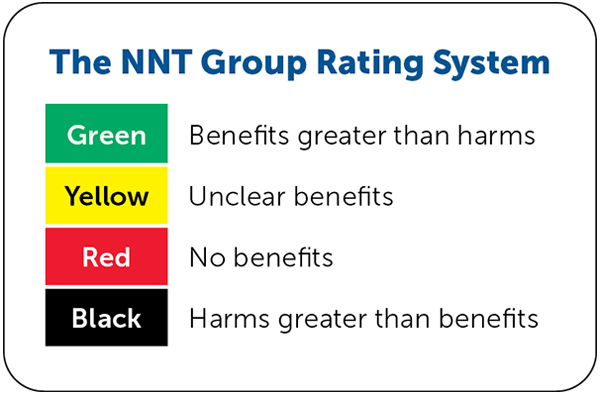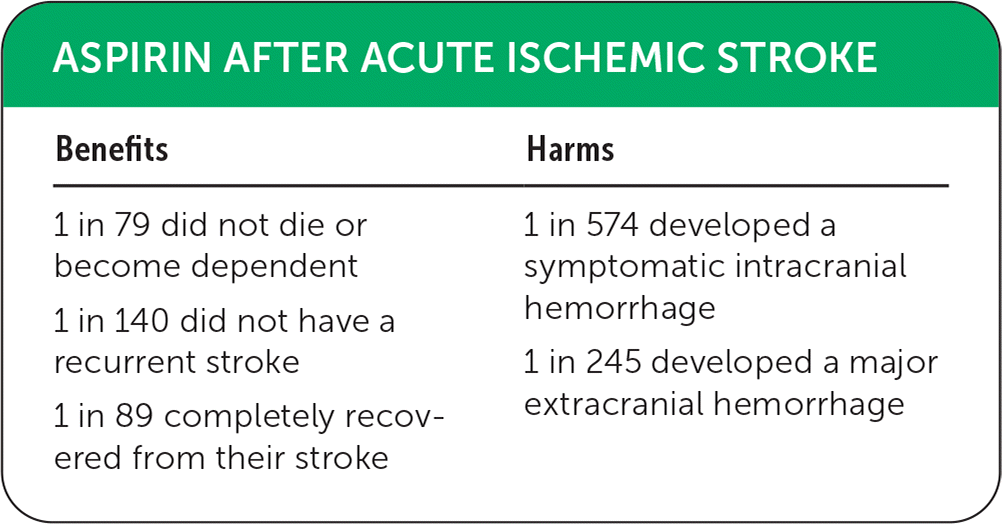
Am Fam Physician. 2020;102(5):online
Author disclosure: No relevant financial affiliations.

Details for This Review
Study Population: Adults presenting with acute stroke
Efficacy End Points: Death or dependence, recurrent stroke, complete recovery from stroke
Harm End Points: Symptomatic intracranial hemorrhage, major extracranial hemorrhage

| Benefits | Harms |
|---|---|
| 1 in 79 did not die or become dependent 1 in 140 did not have a recurrent stroke 1 in 89 completely recovered from their stroke | 1 in 574 developed a symptomatic intracranial hemorrhage 1 in 245 developed a major extracranial hemorrhage |
Narrative: Each year in the United States, approximately 610,000 people have a stroke for the first time, and an additional 185,000 have recurrent strokes. Of these, 87% are ischemic strokes,1 and are most often caused by thrombosis or embolism and a subsequent lack of blood flow. In ischemic strokes, platelets become activated and release neurotoxic and thrombogenic molecules,2 which makes antiplatelet therapy a logical choice. A potential harm of this therapy is bleeding, especially intracranially. The goal of this summary is to provide updated evidence on the safety and effectiveness of immediate oral antiplatelet therapy in patients presenting with acute ischemic stroke.
This Cochrane systematic review identified eight randomized controlled trials involving 41,483 predominantly older patients with presumed acute ischemic stroke.3 Two studies (International Stroke Trial [IST]4 and the Chinese Acute Stroke Trial [CAST]5), accounted for 98% of the data. The IST randomized patients to receive 300 mg per day of aspirin for two weeks or no treatment, and the CAST randomized patients to receive 160 mg per day of aspirin for four weeks or placebo within 48 hours of presentation. The primary outcome was death or dependency at least one month after stroke (six months for patients in the IST and one month for patients in the CAST). Secondary outcomes measured during the treatment period (two weeks for IST and four weeks for CAST) were recurrent stroke, intracranial hemorrhage, major extracranial hemorrhage, and complete recovery from the stroke.
Aspirin therapy was associated with a decreased risk of death or dependency (odds ratio [OR] = 0.95; 95% CI, 0.91 to 0.99; absolute risk difference [ARD] = 1.3%; number needed to treat [NNT] = 79) and recurrent stroke (OR = 0.77; 95% CI, 0.69 to 0.87; ARD = 0.7%; NNT = 140), and an increased likelihood of complete recovery (OR = 1.06; 95% CI, 1.01 to 1.11; ARD = 1.1%; NNT = 89). Aspirin therapy was also associated with an increased risk of symptomatic intracranial hemorrhage (OR = 1.23; 95% CI, 1.00 to 1.50; ARD = 0.2%; number needed to harm [NNH] = 574), and an increased risk of major extracranial hemorrhage (OR = 1.69; 95% CI, 1.35 to 2.11; ARD = 0.4%; NNH = 245).3
Caveats: The quality of evidence was generally good, and there was low heterogeneity. However, there were several limitations to the data. In the CAST and IST studies, 87% and 67% of patients, respectively, did not undergo computed tomography before randomization.4,5 Because approximately 13% of strokes are hemorrhagic,1 intracranial hemorrhages that were initially present may have been missed. In the IST, patients and clinicians were not blinded, which may have introduced bias. For example, clinicians may have been more likely to order computed tomography for patients on treatment and thus may have identified more intracranial hemorrhages. The authors of the IST downplay these concerns by pointing out the results were similar to the CAST, which was blinded, and that most patients did not recall their treatment allocation at six months.5 Another limitation was the variability in the studies. For the IST and CAST studies, the treatment duration, follow-up time, and aspirin dose varied. Notably, in the IST the primary outcome was determined based on six months of follow-up, whereas in the CAST follow-up was at one month. In several of the other, smaller studies (representing less than 2% of the data), alternative antiplatelet drug regimens were used. This review was also unable to determine the ideal time for aspirin initiation. There was no difference found between patients who started aspirin zero to 24 hours from stroke onset and those who started 25 to 48 hours from stroke onset.6 It is likely that aspirin should be initiated as soon as possible after onset because, in the first 24 hours, intracranial hemorrhage is unlikely, but recurrent ischemic stroke is relatively common.
Conclusion: Aspirin therapy given within 48 hours of acute ischemic stroke had a small but significant effect in reducing the risk of death, dependence, or recurrent stroke, and increased the chance of complete recovery, although it was associated with an increased risk of bleeding. Aspirin is safe, inexpensive, easy to administer, and widely available. Based on the evidence of this systematic review, we have chosen a green rating (benefits greater than the harms) for aspirin therapy after an acute ischemic stroke.
